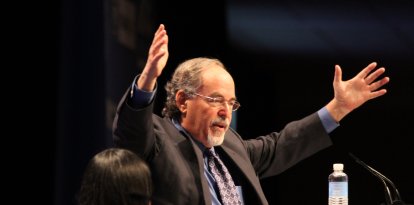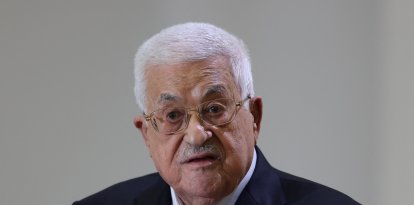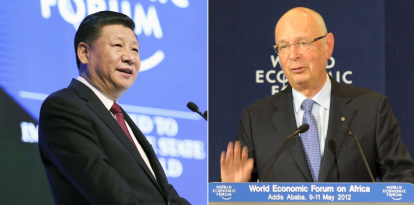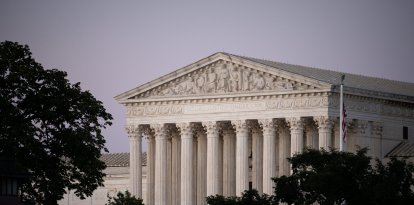Palestinians demand sympathy while spreading hate
What is truly astonishing about all the befuddlement Palestinians are experiencing is their inability to acknowledge that they are the darlings of international diplomacy, the press, academia and elite opinion.
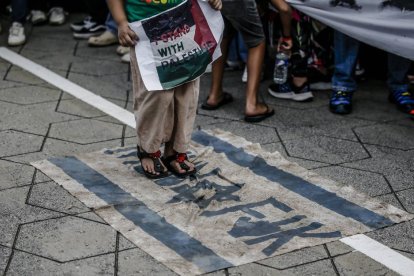
(Cordon Press)
Since the atrocities of Oct. 7 and the launching of a war begun by Hamas against Israel, the voices of Palestinian Arabs have never been so loud. We hear them in videos and interviews conducted in the Gaza Strip, on the streets of American and European cities, and at college campuses throughout the United States. And, of course, their plight is all over the pages of the most prestigious newspapers, like The New York Times, where they are seconded by anti-Zionist Jews who join in the laments about their cruel fate in Gaza. It is a narrative from which they never stray; the Palestinians continue to be oppressed and murdered by heartless Israelis, and ignored and dismissed by equally heartless Americans, who mindlessly support the Zionist state that has done them so much harm.
A culture of grievance
These Palestinian voices have a lot to tell us. Though their argument is principally focused on a sense of grievance about Israel, Zionism and the Jews—and a burning resentment about what is expected of them—it is also about a sense of entitlement. They believe they are entitled to our sympathy and can never quite comprehend why they don’t get more of it. At the heart of every Palestinian manifesto or cri de coeur published in or broadcast by liberal corporate media outlets is a sense of astonishment that anyone would question their intrinsic status as victims. The same goes for the idea that anyone demand that they disavow those who, with good reason, claim to speak for them while committing unspeakable crimes and rejecting peace.
It is that toxic mixture of grievance and entitlement that is behind the videos of those who tear down posters with the faces of Israelis taken hostage by Hamas. It is equally responsible for others on social media who illustrate the sense of glee and release that so many Palestinians and their supporters felt upon hearing the news of the Oct. 7 attacks, coupled with the toll of Jewish dead and suffering exacted during the pogroms those terrorists carried out.
It is also present in those videos depicting real suffering in Gaza as the Israel Defense Forces strike back at Hamas targets inside the area they have ruled as an independent Palestinian state in all but name, and from which they have launched rocket and missile attacks aimed at killing Israeli civilians and terrorist infiltrations like that of Oct. 7. They cannot seem to understand why the entire world isn’t more outraged about their plight. More to the point, they take it as an intolerable insult when questioners ask them to disavow crimes committed in their name or about the choices they’ve made, or whether their leaders or the cause they’ve embraced bears even a tiny fraction of the responsibility for the position they’re now in.
What is truly astonishing about all the befuddlement Palestinians are experiencing is their inability to acknowledge that they are the darlings of international diplomacy, the press, academia and elite opinion.
To the astonishment of Jews and Israelis, the unspeakable crimes committed against Jewish men, women and children, including the murder of 1,400, the wounding of thousands and the kidnapping of more than 200 people on Oct. 7 has actually given the Palestinian cause the boost the Hamas terrorists hoped it would. That’s particularly true in the Arab world, where, as The New York Times reports, the violence has “reignited” the “passion for the Palestinian cause.”
It’s also true in the West, where rallies on behalf of the most extreme Palestinian demands are chanted by students at universities who are hardly unaware that by chanting “from the river to the sea, Palestine will be free,” they are calling for the elimination of Israel and the genocide of its 7 million Jewish citizens. Demonstrations in major cities echo that cry while mocking the misery that Hamas has inflicted on Jews and ignoring the fact that responsibility for the Palestinian casualties in Gaza belongs to the people who started this war, not those seeking to punish the criminals.
Few have articulated this grievance culture better than Hana Alyan, a Palestinian-American poet and psychologist, who wrote this week in the Times to express her resentment at the lack of empathy for Palestinians, even as the world reacted to a war launched by Palestinian atrocities with a surge of support for them. She thinks it’s awful that Palestinians are always asked to prove their innocence of terrorism or to disavow those who commit acts of terror on behalf of Palestinian nationalism. That’s in spite of the fact that their “spokespersons” are almost never asked what they think about the barbarism of Hamas or Palestinian Islamic Jihad, or if they think the Islamist dictatorship in Gaza is a good thing. The same goes for Palestinians themselves.
She writes, “I don’t hesitate for a second to condemn the killing of any child, any massacre of civilians. It is the easiest ask in the world,” and goes on to demand that such condemnations be extended to all victims. But nowhere in her essay does she actually say that the crimes of Oct. 7 were wrong, or ponder the fact that Hamas and the other organizations that represent her people are dedicated to a solution that eliminates Israel—meaning first slaughtering all of its residents. Like almost all Palestinians, she doesn’t specifically condemn her own people’s acts of terrorism, even while demanding that Israeli airstrikes that seek to punish the terrorists be condemned. And even as she and others invoke the specter of Islamophobia as a plague afflicting America, she is oblivious to the fact that Arabs and Muslims have become the principal sources of antisemitism, as pro-Hamas marches and shouting matches have made clear.
How else can one explain the widespread sympathy for people who start a war by crossing borders and murdering young and old, but then cry foul when the nation they assault seeks to stop them from repeating such crimes?
Instead, she subtly reinforces the nakba narrative of Arab victimhood, invoking their “catastrophic” dispossession while not acknowledging that Jews were also made refugees across the Middle Eastern countries they called home in 1948 and the years that followed. It’s only the Arabs who are treated as victims and therefore must be compensated for their trouble by Israel’s destruction.
Another Palestinian given space on the opinion pages of the Times, Fadi Abu Shammalah, who is described as a Gazan community activist, said he empathized with Israeli victims but then went on to rationalize the Oct. 7 atrocities as the inevitable result of policies coming out of Jerusalem. He claimed that the “fighters” who slaughtered entire families—and raped, tortured and desecrated the bodies of the living and the corpses of the slain—were just kids who grew up under “occupation.” The truth is that these murderers have passed their childhoods, adolescence and young adulthood living in a Gaza that had no Jews and was ruled by Hamas, not Israel.
Palestinian Arabs have had a rough time of it in the last century. They had the bad luck of living in a country where another people—the Jews—had ties that stretched back thousands of years. Unlike almost all other ancient civilizations, the Jews stubbornly refused to disappear and just die. Their presence on the land had never entirely vanished throughout two millennia of exile; in fact, it had begun to return in the late 19th century. In the 20th century, Zionism—the national liberation movement of the Jews—triumphed, much to the dismay of the Arab and Muslim world.
Arabs there who had never previously formed a distinctive identity or nation belatedly organized themselves in response to growing Zionism. But unlike other nationalist movements of the late 19th and early 20th centuries, there was little to drive their efforts other than a desire to deny the land to the Jews. Betrayed by venal, foolish and hateful leaders—and ideologically opposed to any compromise with the Jews that would have enabled them to peaceably share or divide the country—the Arabs chose war in 1947-48 rather than accept the U.N. Partition Plan that had granted them their own state alongside the one for the Jews.
While Israeli statesman Abba Eban characterized that choice and their subsequent rejections of peace offers as showing that “the Palestinians never miss an opportunity to miss an opportunity,” he was partly wrong. The Palestinians have never viewed any of those chances for statehood or peace as opportunities. They continue to see anything short of turning the clock back a century and erasing Israel’s existence as more evidence of their oppression and victimhood.
A refusal to look inward
Still, they continue to garner support for this false narrative from the international community and the United Nations. And, given the support of even some claiming to be supporters of Israel for efforts to allow the resupply of Hamas-controlled Gaza during the conflict, they are also being held exempt from the consequences of their decisions. How else can one explain the widespread sympathy for people who start a war by crossing borders and murdering young and old, but then cry foul when the nation they assault seeks to stop them from repeating such crimes?
Palestinians are suffering. But the authors of their problems remain the leaders, groups and rank-and-file supporters in Gaza, Judea and Samaria or abroad who back up their suicidal choices to embrace an endless, unwinnable conflict. Add to that their resort to terrorism, rather than simply acknowledging defeat in their long war against Zionism and succumb to living in peace alongside the Jewish state, and you have a formula for despair but not a case that should be mistaken for anything resembling justice.
What is lacking in all of these Palestinian grievance sessions is not so much a willingness to apologize for Oct. 7. Neither Israel nor the world needs their spiritual renewal or repentance.
What is needed is a willingness to look inward and acknowledge that it is not “cruel” Jews or an indifferent world that put them in this position but their own commitment to a national identity that seeks to deny the humanity and rights of Jews. Until that happens, they will, no doubt, continue to nurture their grievances. But as long as they do so, their suffering and those who fall victim to the murderous Islamist ideology that continues to be their principal mode of national expression, will continue. That is a plight that deserves our pity but surely not our sympathy.
© JNS
RECOMMENDATION
